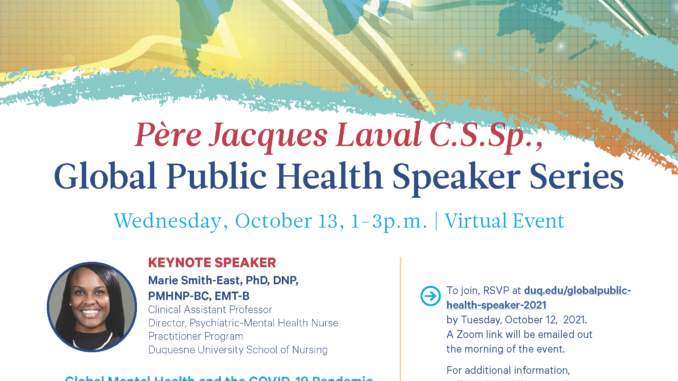
Christiana Cates | staff writer
Oct. 14, 2021
The Global Public Health Speaker Series hosted by The Center for African Studies held a virtual webinar on Wed. Oct. 13, featuring Clinical Assistant professor and director of the psychiatric-mental health nurse practitioner program at Duquesne University, Dr. Marie Smith- East.
The webinar titled “Global Mental Health and the Covid-19 Pandemic” featured endowed chair and director at the center for african studies, Dr. Gerald Boodoo, as well as outreach coordinator and staff counselor, Sara Kyles-Roysterm, to discuss our current state of global mental health particularly in young adults.
The presentation began with an introductory poll for students and attendees to assess their knowledge of the current state of mental health affairs. It highlighted key statistics: that over 90% of mental health services have been on hold or disbanded in the midst of the Covid-19 pandemic. Furthermore, that of the adult category, young adults are more likely to report mental health issues.
“Just personally from my own practice, loved ones are concerned about [students inclination toward] substance abuse during the pandemic,”said Dr.Smith-East.
Recently in the United States, a college institution made headlines for mental health in relation to the pandemic. Just yesterday, UNC Chapel Hill cancelled classes for a Wellness Day in the midst of two students [allegedly] dying by suicide in the last month.
The chancellor of UNC Chapel Hill stated in a message to the community on October 10: “Today, on World Mental Health Day, we are taking a moment to acknowledge and reflect on the seriousness of mental health illness and the challenges we face as we wrestle with the stress and pressures of our world today. We are in the middle of a mental health crisis, both on our campus and across our nation, and we are aware that college-aged students carry an increased risk of suicide. This crisis has directly impacted members of our community – especially with the passing of two students on campus in the past month.”
This highlights some of what the webinar host Dr. Smith-East discussed in relation to stress, anxiety and mental health. She presented a framework diagram that discussed conditions in which excellence in mental health are achieved.
Included are the categories of Vital Community Conditions which listed criteria of: belonging, lifelong learning, basics needs for health and safety and humane housing. The engagement category listed sub-categories of: Health Systems, workplace and unemployment, [a] whole community, judicial system and education system. One of the outcomes to some of the categories mentioned was improved community conditions.
The webinar featured resources available to Duquesne University students, including a crisis hotline at: 1-800-273-TALK.
Dr. Smith-East reiterated that our campus has multiple resources for students in need including Duquesne’s Counseling Services in which she mentioned has seen increased numbers of visits during the pandemic.
“One of the reasons why we wanted to focus on mental health even prior to Covid-19, was simply because of the rise of the amount of students that were complaining of a lot of anxiety and depression. Part of this session was really to help our university community to understand some of these issues and also to perhaps hear some suggestions as to how we may be able to manage or handle it,” Dr. Boodoo said.
Dr. Smith-East presented a case scenario that could help students recognize others mental health issues. In the example scenario, your friend may be missing more often in terms of communication and may have voiced frustrations about how they are having a tough time during the pandemic, they also could be having trouble getting out of bed or sleeping. This scenario used these indicators as a way to show suggestions on how to help that friend. Dr. Smith-East says you can check on them, and suggest programs and services for them to use without being intrusive. Showing that you cared for that person can comfort them and can possibly help them seek assistance that they may need.



